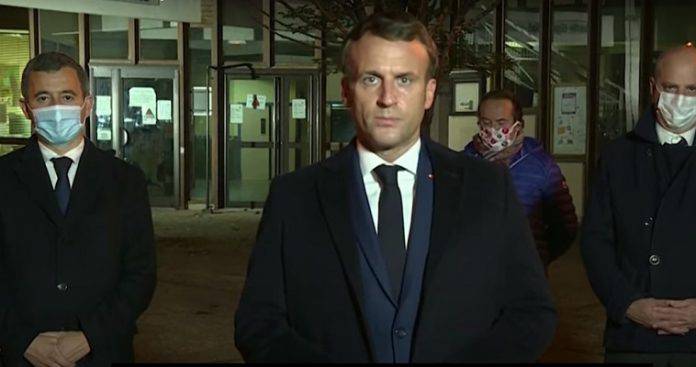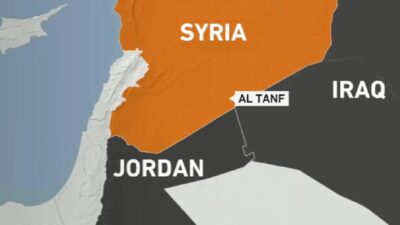Stavros Lygeros: The invasion of the Islamic “Middle Ages” in the 21st century of the West
19/10/2020
The beheading of the French professor by the 18-year-old Chechen jihadist, about three weeks after he a young Pakistani stabbed a journalist with a knife, dramatically brings back to the agenda the crucial question of whether or not fundamentalist Islam is compatible with Western life.
The reason for the last two attacks of Islamic terrorism is the infamous sketches of Muhammad, published by the satirical magazine Charlie Hebdo, whose editor in January 2015 had been massacred in a jihadist attack. That attack may not be comparable in terms of the number of casualties to deadly bombings, but it clearly contained the message of the “holy war” that Islamic terrorism has declared against not some Western governments, but against the values of Western civilization. .
As is always the case after any such attack, the question arises as to whether or not it is linked to Islamic identity. European liberals and leftists believed that the integration of Muslim immigrants into the productive process would soon lead not only to social integration but also to their assimilation into the Western way of life.
They had arrogantly underestimated the power of the religious-cultural difference. That is why, even after decades, the degree of integration of Muslims is disappointing. In the big European cities, informal ghettos have been established that function as parallel micro-societies and in fact in contradiction with the wider society. Islamic fundamentalism is also developing in third-generation Muslim communities.
Underestimating Islamic identity
Despite the lessons that reality teaches, supporters of a multicultural society continue to underestimate the uniqueness and power of Islamic identity. Islam is not a simple religion. It is at the same time a legal system that determines the way of life of the faithful. A legal system, in fact, incompatible with the liberal constitutional principles, the legal culture, and the morals of western societies.
For the believer in the extreme interpretation of the Qur’an living in the West, this incompatibility is a source of contradiction. He must either violate his faith or violate his legal obligations as a citizen. He usually accepts them only ostensibly. For the fanatical Islamist there is not even a contradiction. His point of reference is the Qur’an and Sharia (Islamic law). The constitution and laws of the western state in which he lives are rejected and despised.
This practically means that anyone who adheres to Islamic fundamentalism is not a mere violator of a law. It is a total denial of Western values, as well as their legal and moral derivatives. Hence the strong reaction of the father of the Muslim student, who had voluntarily remained in the classroom, when the unfortunate teacher asked the Muslim students to leave in order to show the sketches of Charlie Hebdo.
Tendency to ghettoize
In extreme cases, the intensity of Islamic identity takes on a dimensions of rejection of Western society itself. The young Pakistani who wounded four with a knife in late September belongs to the category of “pseudo-minors” and should have been grateful to the country, which, although he had no papers, has been hosting him since 2018 and provided him with subsidies.
Fanatic Islamists, even third-generation immigrants, consider the country where they were born and live their religious-cultural enemy. They can even kill their neighbors. That is why, when they carry out terrorist attacks, they take the mourning and indignation of European societies as a confirmation of the importance of their act in the context of the “holy war”.
Islamic identity and intolerance of the Western way of life often pushes Muslims into ghettoization. But even when they do, they are usually superficially part of the western way of life. It is not only the head coverings of women and even worse the burqa. The concept of “freedom of expression”, which the unfortunate teacher tried to teach his students, is incompatible at least with fundamentalist Islam. In fact, it is an invasion of a peculiar religious sort of Middle Ages in the western 21st century.
Wave of Islamophobia
The manifestations of this cultural contradiction cause Western societies to have reservations about the Islam that has settled within them. The reservation would be limited and shallow if it were not exacerbated by Islamic terrorism and the fact that Islamic fundamentalism (the extreme version of which is Islamic terrorism) is legitimized within Muslim communities.
The modern wave of Islamophobia does not stem from religious rivalry. In the West, religious belief and worship is a private matter and is generally respected. It stems from the realization that at least the extreme version of Islamic identity is incompatible with the Western way of life. This is the reason why the model of a multicultural society has entered an existential crisis.
That being the case, the denunciation of Islamophobia is not enough to stop a phenomenon that stems from and is fueled by charged cultural contradictions. The formalism of those claiming “political correctness” does not bother to understand these contradictions and the deeper currents they produce. All he has to do is wave his finger and denounce as a “racist” anyone who sees the problem. In this way, however, not only is Islamophobia not stopped, but it is exacerbated. History is full of various types of zealots who with their attitude brought the opposite of the desired result.
Without moral barriers
Unlike other categories of terrorists, who maintain some kind of moral barrier, Islamic terrorism is prone to overcoming any inhibition. The outbreak of absolute hatred catalyzes the limitations that Humanity has placed in the course of history on the ways of conducting hostilities. As long as the perpetrators consider themselves martyrs for a sacred purpose, they do not hesitate to drag civilians, even small children, to their deaths. In their eyes, after all, Westerners are not only “infidels” but also enemies.
For them, the enemy is not only the institutions of a state. The enemy is the values of the Enlightenment. The use of any means that cultivate terror in the enemy is legitimate. That is why the jihadists like the ritual beheadings, videotaped, like those carried out by ISIS, or “live”, like the French professor. In fact, Islamic terrorism represents an asymmetric threat, ideologically reminiscent of a civil war.
Politics rarely in itself leads to such extreme behaviors. In this case, the existence of the religious background and the Islamic-legitimized concept of “holy war” (jihad) play a decisive role. This does not mean that the cause of Islamic terrorism is religious dogma. Such an identification would be not only inappropriate, but also dangerous.
Cultural gap
On the other hand, however, those who in the name of political correctness deny the existence of any relationship between the two are blind. Islamic terrorism is legitimized by an extreme reading of the Koran. It is no coincidence that e.g. no Serb carried out a terrorist suicide attack, although his country was bombed and humiliated by Western forces. It is no coincidence that the bloody attacks of the jihadists are enthusiastically received by millions of ordinary Muslims around the world.
In fact, Islamic fundamentalism is fueled by the cultural divide that separates the Muslim world from the West. The usually imaginary attacks of the jihadists maximize the political-psychological impact on Western public opinion. Due to the huge coverage by the international media, they leave a deeper mark. They cause a lot of noise and even greater insecurity. The pervasive threat turns people into slaves of fear and thus destabilizes their daily lives. In other words, Islamic terrorism is primarily a tool of psychological warfare.
The new generation of jihadists born and raised in the United States and Europe, as well as the large number of refugee-immigrants who have flooded Europe in recent years, are expanding the operational capabilities of the Islamic terrorist network, but mainly fuel small-scale attacks by “lonely wolves “against unprotected targets, such as the last two, the Pakistani and the Chechen attacks in France.





